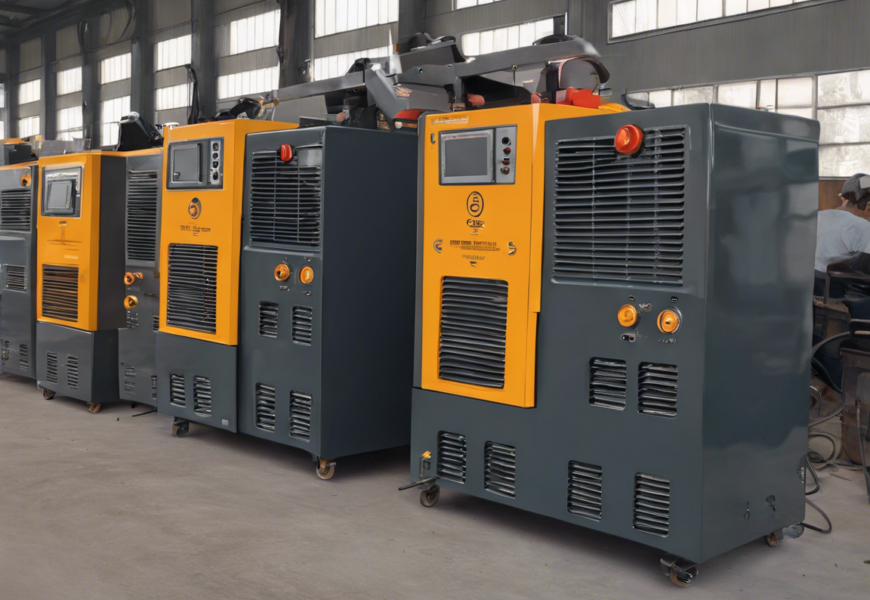When it comes to welding, having the right welding machine is crucial. Whether you are a professional welder or a DIY enthusiast, selecting the appropriate welding machine can impact the quality and efficiency of your work. In this comprehensive guide, we will delve into the world of welding machines, covering everything from types of welding machines to key factors to consider when purchasing one.
Types of Welding Machines:
1. MIG Welding Machines:
- Features: MIG (Metal Inert Gas) machines are easy to use and versatile, making them suitable for beginners and professionals.
- Applications: Ideal for welding thin materials like aluminum and steel in automotive, construction, and DIY projects.
- Advantages: High welding speeds, minimal splatter, and clean welds.
2. TIG Welding Machines:
- Features: TIG (Tungsten Inert Gas) machines provide precise control over the welding process, making them popular for intricate projects.
- Applications: Commonly used for welding stainless steel, copper, and exotic metals in aerospace, automotive, and artistic applications.
- Advantages: Excellent weld quality, no spatter, and the ability to weld thin materials.
3. Stick Welding Machines:
- Features: Also known as Arc welding, stick machines are robust and can handle dirty or rusty materials.
- Applications: Suitable for outdoor welding and industrial fabrication where portability and power are essential.
- Advantages: Versatility in welding different metals, low cost, and ease of maintenance.
4. Multiprocess Welding Machines:
- Features: These machines offer multiple welding processes like MIG, TIG, and Stick in one unit, providing flexibility for various applications.
- Applications: Ideal for welders who need to work with different materials and thicknesses.
- Advantages: Space-saving, cost-effective, and suitable for welders dealing with diverse projects.
Key Factors to Consider When Choosing a Welding Machine:
1. Type of Welding:
- Consider the materials you will be welding and the preferred welding process to determine the most suitable machine.
2. Power Input:
- Ensure the welding machine matches the power supply available in your workshop or job site to prevent electrical issues.
3. Duty Cycle:
- Check the duty cycle of the machine, indicating how long it can weld continuously before needing a cooldown period.
4. Portability:
- If you require mobility for your projects, opt for a lightweight and portable welding machine that suits your needs.
5. Budget:
- Set a budget range based on your requirements and research machines that offer the best features within that budget.
6. Brand Reputation:
- Research and choose reputable brands known for quality machines and reliable customer support.
Frequently Asked Questions (FAQs) About Welding Machines:
1. What safety precautions should I take when using a welding machine?
- Always wear appropriate protective gear like welding helmet, gloves, and clothing. Ensure proper ventilation in the workspace to prevent fume inhalation.
2. Can I weld aluminum with a MIG welding machine?
- Yes, MIG welding machines are suitable for welding aluminum by using the appropriate wire and shielding gas.
3. How do I choose the right welding machine for thick metal welding?
- For thick metal welding, consider a machine with higher amperage capabilities and suitable for the welding process required for the specific metal type.
4. Do I need special training to operate a TIG welding machine?
- While TIG welding requires more skill and practice compared to MIG welding, there are numerous resources, courses, and workshops available to help you learn how to operate a TIG welding machine effectively.
5. What maintenance is required for welding machines?
- Regular maintenance tasks include cleaning the machine, checking for loose connections, inspecting cables and electrodes, and replacing worn-out parts as needed.
In conclusion, selecting the right welding machine is essential for achieving high-quality welds and ensuring efficient welding operations. Consider the type of welding, power input, portability, and budget when choosing a welding machine, and prioritize safety precautions when operating it. With the information provided in this guide, you are now equipped to make an informed decision when investing in a welding machine for your projects.



